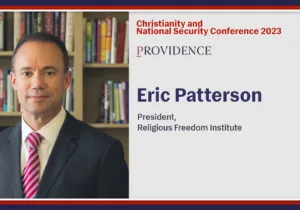In 1948, the French philosopher Albert Camus, an unbeliever, was invited to speak at the Dominican Monastery of Latour-Maubourg. “What the world expects of Christians,” Camus said, reflecting on “the same revulsion from evil” he shared with the assembled faithful, “is that Christians should speak out, loud and clear, and that they should voice their condemnation in such a way that never a doubt, never the slightest doubt, could rise in the heart of the simplest man. That they should get away from abstraction and confront the blood-stained face history has taken on.” Camus, always the generous interlocutor, suggested this was simply “tantamount to saying that the world of today needs Christians who remain Christians.”
What Camus wanted from his Christian friends was that they be co-conspirators in a rebellion against a “universe in which children suffer and die.” Alongside people of faith, Camus took for granted that the manifestation in public and private life of certain words: order, concern, community, justice, responsibility, and love, tend toward the welfare of the innocent; while others: disorder, atomization, solipsism, injustice, desertion, and indifference, tend toward their annihilation. Thus was rendered the belief that there is, therefore, a human responsibility to stand, individually and in solidarity, on the side of the innocent and to resist, even to the point of employing lethal force, those who mean to harm them. In the pages of Providence, this presumption can be refined to assert that Christians specifically, qua Christians, are responsible, particularly so, to do something about evil.
This does not mean we are to do just anything about evil; nor that launch into action before thinking the matter through. Stupid, rash, and pointless actions made by Christians are not somehow baptized into new life but remain, simply, pointless, rash, and stupid. The Christian realist must always assert a political philosophy grounded in limits – that is, limitations both to the amount of political evil we can tolerate in the world around us before taking action against it as well as limits to what we do in those actions. For Camus, the rebellion in which he found common cause with Christians was necessarily marked by this philosophy of limits.
In contrast to what he called the violent revolutionary, Camus’ rebel does not indulge in orgies of unlimited, indiscriminate, or disproportionate violence. Unlike those who wet the Parisian landscape with the blood of the innocent, the rebel, in striving to requite what he believes an injustice, does not revel in hatred and destruction, exult in resentment, or celebrate death. Rather the rebel, or the Christian realist, believes that there are simply times when our responsibility, when love, requires action against those who traffic in massacre.
How to best do this well is intractably complex. It will be the business of Providence and the community of readers and writers that forms around us, co-conspirators really, to address this question and to try and budge one another further along the narrow, proper way, hedged in by limits, urged along by conviction of purpose, and motivated by the pursuit of justice, order, and peace.
Among our fellow rebels are our pool of senior and contributing editors and other like-minded thinkers, each leaders drawn from a number of public spheres including the academic and policy worlds, think tanks, government and defense sectors, and the military. Over the weekend, two of them, Alan Dowd and Eric Patterson, offered substantive early reflections on the Paris attacks. Others will weigh in anon, here and other places.
More briefly, in an email exchange the night of the attacks, I asked David Shedd, Providence friend and retired U.S. intelligence officer, how we ought to begin thinking about the events unfolding. He offered a few bulleted observations outlining some basic commitments to which we ought to adhere. I’ve recast these in paragraph form. He writes:
We continue to face a resilient and capable Islamist enemy intent on attacking us by all available means. Islamic terrorism should be addressed as a pandemic and we must have a strategy to bring all instruments of national power to defeat it. The world must unite in countering those intent on perverting Islam and those committed to the use of violence in their cowardly pursuit of their objectives by killing innocent people regardless of nationality or faith, including Muslims who do not comply with their radical objectives.
The Paris attacks underscore the need for the international community to share intelligence – intentions and warnings – that can potentially thwart these types of attacks. We must be far more aggressive in our efforts to defeat ISIL, al-Qaida and all their affiliates as they seek to promote the establishment of a Caliphate without regard of the international order to include the respect of human rights, freedom of expression and religion
One of the constant complaints against Christian realism is that it too often stumbles into moralistic crusades that lead to the very stupid, rash, and pointless actions I argue against above. Such detractors typically insist that unless our essential national interests – security and material prosperity – are at risk we ought not to interfere in the business of other nations. Providence will spend a great deal of energy arguing against such a desiccated truncation of national interest but, here, I want only to consider the question of whether intervention in Syria might not clear even this more narrowly construed interest hurdle.
To do this I point to another contributing editor, Nigel Biggar; a theological ethicist at Christ Church, Oxford. Writing in the Times of London last month prior to a government vote on using military power in Syria, Biggar pushed back against the idea that Britain didn’t have enough of a dog in that country’s civil-war to warrant increased action. While admitting that, previously, Syria’s geographical remoteness and other factors rendered it only remotely engaged with Britain’s national interests, Biggar insisted times have changed. Now, “with several hundred of our own citizens helping Islamic State to murder its way across Iraq, with £1 billion of taxpayers’ money supporting refugee camps in Jordan, and with asylum seekers in their hundreds of thousands banging on the gates of Europe, Syria has become our problem and solving it is in our interest.”
Last week, just prior to the attacks, Biggar, criticized as “morally indefensible” the recommendation by the House of Commons foreign affairs committee against expanding British military activity in Syria. The committee insists that any extension be preceded by a “coherent international strategy that has a realistic chance of defeating Isil and of ending the civil war in Syria”. Noting that the complexity of the situation on the ground as well as the rival interests of the various parties involved renders any such agreement a long way off, Biggar reminds us that in the meanwhile ISIS “will continue to slaughter the innocent, obliterate history, attract the gullible and multiply refugees.”
In the aftermath of Paris, it is sorrowfully clear just how prescient Biggar was.
Continuing on this question of interest, and ignoring for a happy moment the absolute pacifists amongst us, few would dispute that is the government’s duty to promote the genuine interests of its own people. Keith Pavlischek, senior editor, invokes John Calvin to remind us of the theological stance:
Now if their [civil magistrates’] true righteousness is to pursue the guilty and the impious with drawn sword, should they sheathe their sword and keep their hands clean of blood, while abandoned men wickedly range about with slaughter and massacre, they will become guilty of the greatest impiety, far indeed from winning praise for their goodness and righteousness thereby!
Tracking with their great theological compatriot, France has, indeed, already embarked upon a series of airstrikes to make this very duty quite plain to ISIS. But be that as it may, does the rest of the international community have the same duty to come to France’s aid?
Bracketing for the moment both consideration of NATO commitments as well as specifically moral-theological concerns such as neighbor-love, it seems to me that the “secular” reasons espoused by Nigel Biggar for British involvement ought to be cite for America’s own. Friday night’s attacks prove that the crisis in Syria has spilled over to Europe, most starkly illustrated perhaps by information surfacing that Ahmed Almuhamed, one of the terrorists, apparently gained access to European soil by posing as a Syrian refugee. As America continues to welcome refugees from Syria to our own shores, we need to be cognizant of the now-proved dangers. Add the danger of beasts entering US soil in the Trojan Horse of our charitable hospitality to the increased costs in aid to overseas refugee camps, to our responsibility for our own citizens joining ISIS, and to the increasing instability ISIS is wreaking throughout the levant, and it seems certain that the best way to deal with the threats emerging from the Syrian crisis is to resolve the Syrian crisis.
Precisely what this resolution finally looks like is, of course, not entirely clear. But even as we build the necessary strategy we can concentrate on degrading ISIS, crippling their ability to export terror, and ultimately destroying them. Finally, as Biggar points out in both his Times pieces, the United States, like Britain, are permanent members of the United Nations Security Council. While this is not permission to run roughshod over the international community it is an admission that with great power comes the responsibility to help maintain justice, order, and peace for that community.
Marc LiVecche is managing editor at Providence
Photo: NATO and allied flags fly at half-mast at NATO headquarter, November, 14th, 2015. (http://www.nato.int/cps/en/natohq/photos_124641.htm)







 Sponsor a student for Christianity & National Security 2024
Sponsor a student for Christianity & National Security 2024